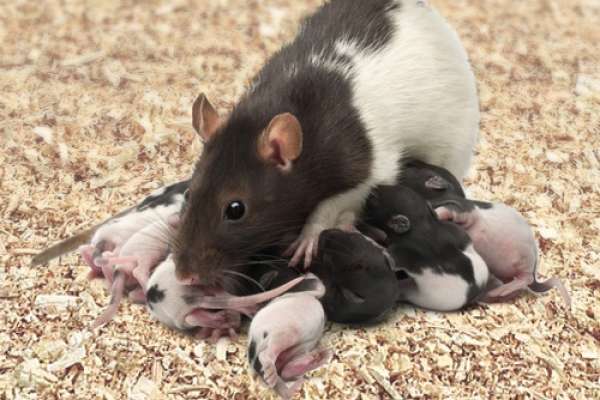Rat pups whose mothers were exposed to stress before and during pregnancy were impaired but also showed signs of resilience, according to a new study by Israeli scientists.
Published in the August issue of the journal Developmental Psychobiology, the research also found that some of the inherited psychological impairments were mitigated by providing therapeutic environments to the stressed rats.
Noting similarities between rat and human physiology, Professors Micah Leshem of the Department of Psychology at the University of Haifa and Jay Schulkin of Georgetown University conducted a cross-generational study on rodents to evaluate the effects of early maternal exposure to stress on offspring and to assess whether or not enrichment interventions would reverse any of those negative consequences. Scientists sought to discover the impact of such stressful human experiences as war or natural disasters on future generations and whether therapeutic enrichments, like adversity, might have trans-generational effects. Rats were used as they mature and reproduce rapidly thereby facilitating generational studies.
The Experiment
Scientists divided 40 young female rats into four groups: a control group comprised of rodents raised normally in individual cages, another group exposed to various stressors when they were 27-29 days old, a third raised in an enriched environment, and a fourth exposed to both stress and enrichment. At adulthood, the subjects were paired and bred, resulting in 625 offspring pups.
The new group of baby rats were then split into two cohorts, with one brought up in a natural environment, and the other in a much more nurturing, enriching setting. This enabled the investigators to assess any benefits of therapy on the next generation. The rats were also measured for social interactions, anxiety levels, learning abilities, fear responses and coping skills.
Offsping Were Socially Anxious, but Knew How to Deal with Stress
The results revealed that while the mothers’ stress impacted the social interaction skills of their offspring, it did improve their ability to learn how to avoid stress. The male offspring were also better able to cope with fear. Some of the negative consequences were lessened by the therapeutic environment provided to the mothers, showing that first stressing the mothers and then enriching their environments mitigated some of the effects on their offspring; likewise, some of the pups benefited from the ‘therapy’ attained by the enriched environments.
The findings, along with research from other studies, prompted researchers to suggest that evolution plays a role in preparing the next generation to better handle similar environments. According to lead author Leshem, this may occur through epigenetic changes, which refer to non-biological gene adaptations occurring in sequence, or as in this case, from one generation to the next.
Scientists concluded that stressful experiences may affect future generations, but the inherited effects may be altered and ameliorated, with further exploration of such cross-generational impacts on humans, in particular, needed. Their study raised questions about how human exposure to stress might affect the next generation, and how timely interventions for individuals and their offspring can repair the damage and strengthen future populations. Hence, they noted, their findings underscore the importance of educational and therapeutic interventions that address stress.
Mark Willson, holding a Ph.D., functions as a psychotherapist in Washington, D.C. His specialized fields encompass addiction, anxiety, depression, as well as sexuality and interpersonal connections. Dr. Willson holds the distinction of being a diplomat for the American Board of Addiction and Anxiety, further serving as a certified counselor and addiction specialist.
Aside from his personal professional endeavors, Dr. Wilson has engaged in roles as an author, journalist, and creator within substantial medical documentary projects.




